标签:str 客户 character schema dir lib dfs -- 保存
正文
sqoop 是 apache 旗下一款“Hadoop 和关系数据库服务器之间传送数据”的工具。
核心的功能有两个:
导入、迁入
导出、迁出
导入数据:MySQL,Oracle 导入数据到 Hadoop 的 HDFS、HIVE、HBASE 等数据存储系统
导出数据:从 Hadoop 的文件系统中导出数据到关系数据库 mysql 等 Sqoop 的本质还是一个命令行工具,和 HDFS,Hive 相比,并没有什么高深的理论。
sqoop:
工具:本质就是迁移数据, 迁移的方式:就是把sqoop的迁移命令转换成MR程序
hive
工具,本质就是执行计算,依赖于HDFS存储数据,把SQL转换成MR程序
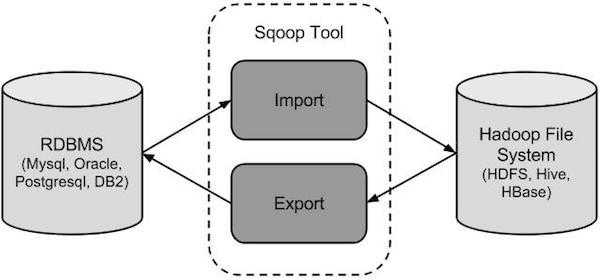
将导入或导出命令翻译成 MapReduce 程序来实现 在翻译出的 MapReduce 中主要是对 InputFormat 和 OutputFormat 进行定制
将来sqoop在使用的时候有可能会跟那些系统或者组件打交道?
HDFS, MapReduce, YARN, ZooKeeper, Hive, HBase, MySQL
sqoop就是一个工具, 只需要在一个节点上进行安装即可。
补充一点: 如果你的sqoop工具将来要进行hive或者hbase等等的系统和MySQL之间的交互
你安装的SQOOP软件的节点一定要包含以上你要使用的集群或者软件系统的安装包
补充一点: 将来要使用的azakban这个软件 除了会调度 hadoop的任务或者hbase或者hive的任务之外, 还会调度sqoop的任务
azkaban这个软件的安装节点也必须包含以上这些软件系统的客户端/2、
下载地址http://mirrors.hust.edu.cn/apache/

sqoop版本说明
绝大部分企业所使用的sqoop的版本都是 sqoop1
sqoop-1.4.6 或者 sqoop-1.4.7 它是 sqoop1
sqoop-1.99.4----都是 sqoop2
此处使用sqoop-1.4.6版本sqoop-1.4.6.bin__hadoop-2.0.4-alpha.tar.gz
因为之前hive只是安装在hadoop3机器上,所以sqoop也同样安装在hadoop3机器上
[hadoop@hadoop3 ~]$ tar -zxvf sqoop-1.4.6.bin__hadoop-2.0.4-alpha.tar.gz -C apps/
[hadoop@hadoop3 ~]$ cd apps/ [hadoop@hadoop3 apps]$ ls apache-hive-2.3.3-bin hadoop-2.7.5 hbase-1.2.6 sqoop-1.4.6.bin__hadoop-2.0.4-alpha zookeeper-3.4.10 [hadoop@hadoop3 apps]$ mv sqoop-1.4.6.bin__hadoop-2.0.4-alpha/ sqoop-1.4.6 [hadoop@hadoop3 apps]$ cd sqoop-1.4.6/conf/ [hadoop@hadoop3 conf]$ ls oraoop-site-template.xml sqoop-env-template.sh sqoop-site.xml sqoop-env-template.cmd sqoop-site-template.xml [hadoop@hadoop3 conf]$ mv sqoop-env-template.sh sqoop-env.sh
[hadoop@hadoop3 conf]$ vi sqoop-env.sh
export HADOOP_COMMON_HOME=/home/hadoop/apps/hadoop-2.7.5 #Set path to where hadoop-*-core.jar is available export HADOOP_MAPRED_HOME=/home/hadoop/apps/hadoop-2.7.5 #set the path to where bin/hbase is available export HBASE_HOME=/home/hadoop/apps/hbase-1.2.6 #Set the path to where bin/hive is available export HIVE_HOME=/home/hadoop/apps/apache-hive-2.3.3-bin #Set the path for where zookeper config dir is export ZOOCFGDIR=/home/hadoop/apps/zookeeper-3.4.10/conf
为什么在sqoop-env.sh 文件中会要求分别进行 common和mapreduce的配置呢???
在apache的hadoop的安装中;四大组件都是安装在同一个hadoop_home中的
但是在CDH, HDP中, 这些组件都是可选的。
在安装hadoop的时候,可以选择性的只安装HDFS或者YARN,
CDH,HDP在安装hadoop的时候,会把HDFS和MapReduce有可能分别安装在不同的地方。
[hadoop@hadoop3 ~]$ cp mysql-connector-java-5.1.40-bin.jar apps/sqoop-1.4.6/lib/

[hadoop@hadoop3 ~]$ vi .bashrc
#Sqoop export SQOOP_HOME=/home/hadoop/apps/sqoop-1.4.6 export PATH=$PATH:$SQOOP_HOME/bin

保存退出使其立即生效
[hadoop@hadoop3 ~]$ source .bashrc
sqoop-version 或者 sqoop version

首先,我们可以使用 sqoop help 来查看,sqoop 支持哪些命令
[hadoop@hadoop3 ~]$ sqoop help Warning: /home/hadoop/apps/sqoop-1.4.6/../hcatalog does not exist! HCatalog jobs will fail. Please set $HCAT_HOME to the root of your HCatalog installation. Warning: /home/hadoop/apps/sqoop-1.4.6/../accumulo does not exist! Accumulo imports will fail. Please set $ACCUMULO_HOME to the root of your Accumulo installation. 18/04/12 13:37:19 INFO sqoop.Sqoop: Running Sqoop version: 1.4.6 usage: sqoop COMMAND [ARGS] Available commands: codegen Generate code to interact with database records create-hive-table Import a table definition into Hive eval Evaluate a SQL statement and display the results export Export an HDFS directory to a database table help List available commands import Import a table from a database to HDFS import-all-tables Import tables from a database to HDFS import-mainframe Import datasets from a mainframe server to HDFS job Work with saved jobs list-databases List available databases on a server list-tables List available tables in a database merge Merge results of incremental imports metastore Run a standalone Sqoop metastore version Display version information See ‘sqoop help COMMAND‘ for information on a specific command. [hadoop@hadoop3 ~]$
然后得到这些支持了的命令之后,如果不知道使用方式,可以使用 sqoop command 的方式 来查看某条具体命令的使用方式,比如:

[hadoop@hadoop3 ~]$ sqoop help import
Warning: /home/hadoop/apps/sqoop-1.4.6/../hcatalog does not exist! HCatalog jobs will fail.
Please set $HCAT_HOME to the root of your HCatalog installation.
Warning: /home/hadoop/apps/sqoop-1.4.6/../accumulo does not exist! Accumulo imports will fail.
Please set $ACCUMULO_HOME to the root of your Accumulo installation.
18/04/12 13:38:29 INFO sqoop.Sqoop: Running Sqoop version: 1.4.6
usage: sqoop import [GENERIC-ARGS] [TOOL-ARGS]
Common arguments:
--connect <jdbc-uri> Specify JDBC connect
string
--connection-manager <class-name> Specify connection manager
class name
--connection-param-file <properties-file> Specify connection
parameters file
--driver <class-name> Manually specify JDBC
driver class to use
--hadoop-home <hdir> Override
$HADOOP_MAPRED_HOME_ARG
--hadoop-mapred-home <dir> Override
$HADOOP_MAPRED_HOME_ARG
--help Print usage instructions
-P Read password from console
--password <password> Set authentication
password
--password-alias <password-alias> Credential provider
password alias
--password-file <password-file> Set authentication
password file path
--relaxed-isolation Use read-uncommitted
isolation for imports
--skip-dist-cache Skip copying jars to
distributed cache
--username <username> Set authentication
username
--verbose Print more information
while working
Import control arguments:
--append Imports data
in append
mode
--as-avrodatafile Imports data
to Avro data
files
--as-parquetfile Imports data
to Parquet
files
--as-sequencefile Imports data
to
SequenceFile
s
--as-textfile Imports data
as plain
text
(default)
--autoreset-to-one-mapper Reset the
number of
mappers to
one mapper
if no split
key
available
--boundary-query <statement> Set boundary
query for
retrieving
max and min
value of the
primary key
--columns <col,col,col...> Columns to
import from
table
--compression-codec <codec> Compression
codec to use
for import
--delete-target-dir Imports data
in delete
mode
--direct Use direct
import fast
path
--direct-split-size <n> Split the
input stream
every ‘n‘
bytes when
importing in
direct mode
-e,--query <statement> Import
results of
SQL
‘statement‘
--fetch-size <n> Set number
‘n‘ of rows
to fetch
from the
database
when more
rows are
needed
--inline-lob-limit <n> Set the
maximum size
for an
inline LOB
-m,--num-mappers <n> Use ‘n‘ map
tasks to
import in
parallel
--mapreduce-job-name <name> Set name for
generated
mapreduce
job
--merge-key <column> Key column
to use to
join results
--split-by <column-name> Column of
the table
used to
split work
units
--table <table-name> Table to
read
--target-dir <dir> HDFS plain
table
destination
--validate Validate the
copy using
the
configured
validator
--validation-failurehandler <validation-failurehandler> Fully
qualified
class name
for
ValidationFa
ilureHandler
--validation-threshold <validation-threshold> Fully
qualified
class name
for
ValidationTh
reshold
--validator <validator> Fully
qualified
class name
for the
Validator
--warehouse-dir <dir> HDFS parent
for table
destination
--where <where clause> WHERE clause
to use
during
import
-z,--compress Enable
compression
Incremental import arguments:
--check-column <column> Source column to check for incremental
change
--incremental <import-type> Define an incremental import of type
‘append‘ or ‘lastmodified‘
--last-value <value> Last imported value in the incremental
check column
Output line formatting arguments:
--enclosed-by <char> Sets a required field enclosing
character
--escaped-by <char> Sets the escape character
--fields-terminated-by <char> Sets the field separator character
--lines-terminated-by <char> Sets the end-of-line character
--mysql-delimiters Uses MySQL‘s default delimiter set:
fields: , lines: \n escaped-by: optionally-enclosed-by: ‘
--optionally-enclosed-by <char> Sets a field enclosing character
Input parsing arguments:
--input-enclosed-by <char> Sets a required field encloser
--input-escaped-by <char> Sets the input escape
character
--input-fields-terminated-by <char> Sets the input field separator
--input-lines-terminated-by <char> Sets the input end-of-line
char
--input-optionally-enclosed-by <char> Sets a field enclosing
character
Hive arguments:
--create-hive-table Fail if the target hive
table exists
--hive-database <database-name> Sets the database name to
use when importing to hive
--hive-delims-replacement <arg> Replace Hive record \0x01
and row delimiters (\n\r)
from imported string fields
with user-defined string
--hive-drop-import-delims Drop Hive record \0x01 and
row delimiters (\n\r) from
imported string fields
--hive-home <dir> Override $HIVE_HOME
--hive-import Import tables into Hive
(Uses Hive‘s default
delimiters if none are
set.)
--hive-overwrite Overwrite existing data in
the Hive table
--hive-partition-key <partition-key> Sets the partition key to
use when importing to hive
--hive-partition-value <partition-value> Sets the partition value to
use when importing to hive
--hive-table <table-name> Sets the table name to use
when importing to hive
--map-column-hive <arg> Override mapping for
specific column to hive
types.
HBase arguments:
--column-family <family> Sets the target column family for the
import
--hbase-bulkload Enables HBase bulk loading
--hbase-create-table If specified, create missing HBase tables
--hbase-row-key <col> Specifies which input column to use as the
row key
--hbase-table <table> Import to <table> in HBase
HCatalog arguments:
--hcatalog-database <arg> HCatalog database name
--hcatalog-home <hdir> Override $HCAT_HOME
--hcatalog-partition-keys <partition-key> Sets the partition
keys to use when
importing to hive
--hcatalog-partition-values <partition-value> Sets the partition
values to use when
importing to hive
--hcatalog-table <arg> HCatalog table name
--hive-home <dir> Override $HIVE_HOME
--hive-partition-key <partition-key> Sets the partition key
to use when importing
to hive
--hive-partition-value <partition-value> Sets the partition
value to use when
importing to hive
--map-column-hive <arg> Override mapping for
specific column to
hive types.
HCatalog import specific options:
--create-hcatalog-table Create HCatalog before import
--hcatalog-storage-stanza <arg> HCatalog storage stanza for table
creation
Accumulo arguments:
--accumulo-batch-size <size> Batch size in bytes
--accumulo-column-family <family> Sets the target column family for
the import
--accumulo-create-table If specified, create missing
Accumulo tables
--accumulo-instance <instance> Accumulo instance name.
--accumulo-max-latency <latency> Max write latency in milliseconds
--accumulo-password <password> Accumulo password.
--accumulo-row-key <col> Specifies which input column to
use as the row key
--accumulo-table <table> Import to <table> in Accumulo
--accumulo-user <user> Accumulo user name.
--accumulo-visibility <vis> Visibility token to be applied to
all rows imported
--accumulo-zookeepers <zookeepers> Comma-separated list of
zookeepers (host:port)
Code generation arguments:
--bindir <dir> Output directory for compiled
objects
--class-name <name> Sets the generated class name.
This overrides --package-name.
When combined with --jar-file,
sets the input class.
--input-null-non-string <null-str> Input null non-string
representation
--input-null-string <null-str> Input null string representation
--jar-file <file> Disable code generation; use
specified jar
--map-column-java <arg> Override mapping for specific
columns to java types
--null-non-string <null-str> Null non-string representation
--null-string <null-str> Null string representation
--outdir <dir> Output directory for generated
code
--package-name <name> Put auto-generated classes in
this package
Generic Hadoop command-line arguments:
(must preceed any tool-specific arguments)
Generic options supported are
-conf <configuration file> specify an application configuration file
-D <property=value> use value for given property
-fs <local|namenode:port> specify a namenode
-jt <local|resourcemanager:port> specify a ResourceManager
-files <comma separated list of files> specify comma separated files to be copied to the map reduce cluster
-libjars <comma separated list of jars> specify comma separated jar files to include in the classpath.
-archives <comma separated list of archives> specify comma separated archives to be unarchived on the compute machines.
The general command line syntax is
bin/hadoop command [genericOptions] [commandOptions]
At minimum, you must specify --connect and --table
Arguments to mysqldump and other subprograms may be supplied
after a ‘--‘ on the command line.
[hadoop@hadoop3 ~]$
[hadoop@hadoop3 ~]$ sqoop list-databases \ > --connect jdbc:mysql://hadoop1:3306/ \ > --username root \ > --password root Warning: /home/hadoop/apps/sqoop-1.4.6/../hcatalog does not exist! HCatalog jobs will fail. Please set $HCAT_HOME to the root of your HCatalog installation. Warning: /home/hadoop/apps/sqoop-1.4.6/../accumulo does not exist! Accumulo imports will fail. Please set $ACCUMULO_HOME to the root of your Accumulo installation. 18/04/12 13:43:51 INFO sqoop.Sqoop: Running Sqoop version: 1.4.6 18/04/12 13:43:51 WARN tool.BaseSqoopTool: Setting your password on the command-line is insecure. Consider using -P instead. 18/04/12 13:43:51 INFO manager.MySQLManager: Preparing to use a MySQL streaming resultset. information_schema hivedb mysql performance_schema test [hadoop@hadoop3 ~]$
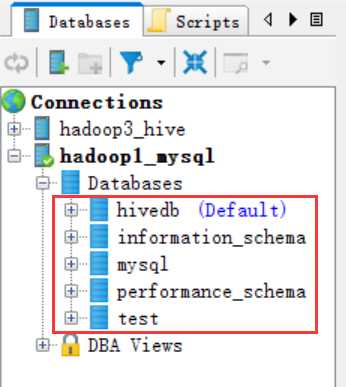
[hadoop@hadoop3 ~]$ sqoop list-tables \
> --connect jdbc:mysql://hadoop1:3306/mysql \
> --username root \
> --password root
 View Code
View Codesqoop create-hive-table --connect jdbc:mysql://hadoop1:3306/mysql --username root --password root --table help_keyword --hive-table hk
 View Code
View Code“导入工具”导入单个表从 RDBMS 到 HDFS。表中的每一行被视为 HDFS 的记录。所有记录 都存储为文本文件的文本数据(或者 Avro、sequence 文件等二进制数据)
sqoop import (generic-args) (import-args)
常用参数
--connect <jdbc-uri> jdbc 连接地址 --connection-manager <class-name> 连接管理者 --driver <class-name> 驱动类 --hadoop-mapred-home <dir> $HADOOP_MAPRED_HOME --help help 信息 -P 从命令行输入密码 --password <password> 密码 --username <username> 账号 --verbose 打印流程信息 --connection-param-file <filename> 可选参数
普通导入:导入mysql库中的help_keyword的数据到HDFS上
导入的默认路径:/user/hadoop/help_keyword
sqoop import --connect jdbc:mysql://hadoop1:3306/mysql --username root --password root --table help_keyword -m 1
 View Code
View Code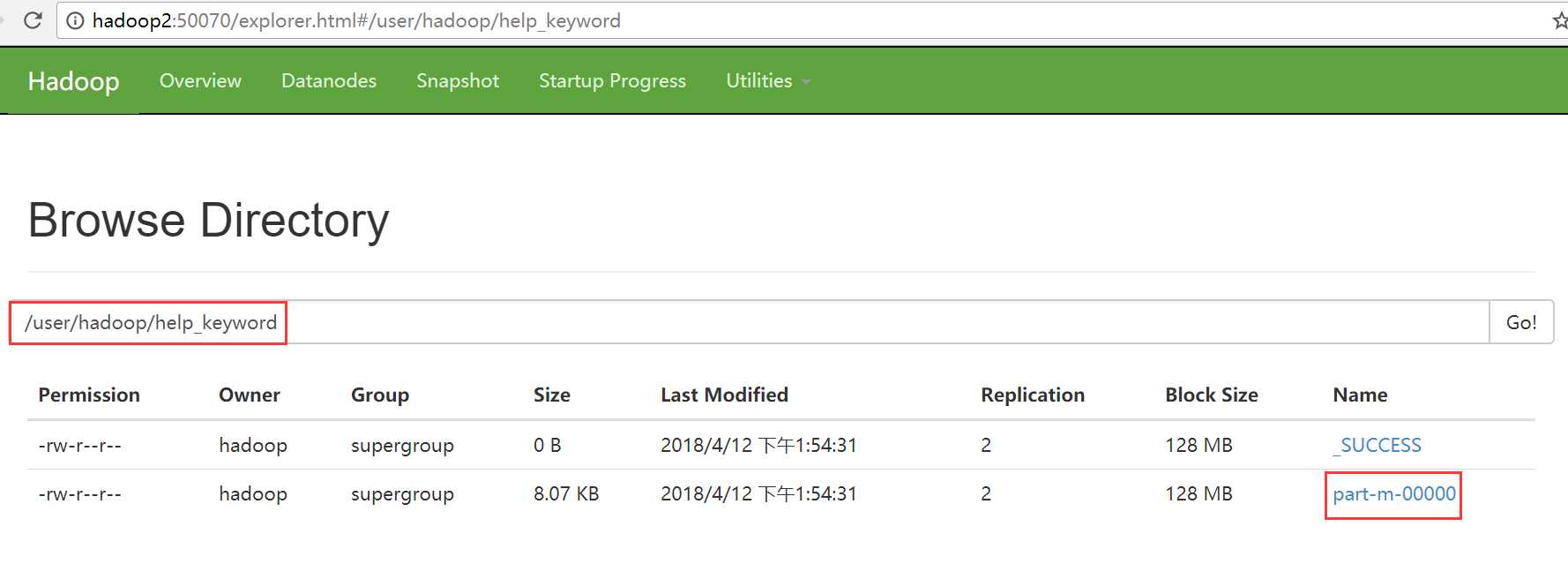
查看导入的文件
[hadoop@hadoop4 ~]$ hadoop fs -cat /user/hadoop/help_keyword/part-m-00000
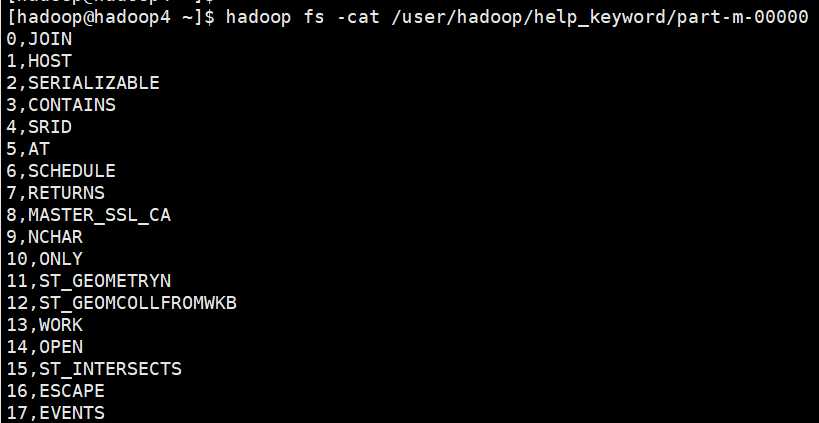
导入: 指定分隔符和导入路径
sqoop import --connect jdbc:mysql://hadoop1:3306/mysql --username root --password root --table help_keyword --target-dir /user/hadoop11/my_help_keyword1 --fields-terminated-by ‘\t‘ -m 2
导入数据:带where条件
sqoop import --connect jdbc:mysql://hadoop1:3306/mysql --username root --password root --where "name=‘STRING‘ " --table help_keyword --target-dir /sqoop/hadoop11/myoutport1 -m 1
查询指定列
sqoop import --connect jdbc:mysql://hadoop1:3306/mysql --username root --password root --columns "name" --where "name=‘STRING‘ " --table help_keyword --target-dir /sqoop/hadoop11/myoutport22 -m 1 selct name from help_keyword where name = "string"
导入:指定自定义查询SQL
sqoop import --connect jdbc:mysql://hadoop1:3306/ --username root --password root --target-dir /user/hadoop/myimport33_1 --query ‘select help_keyword_id,name from mysql.help_keyword where $CONDITIONS and name = "STRING"‘ --split-by help_keyword_id --fields-terminated-by ‘\t‘ -m 4
在以上需要按照自定义SQL语句导出数据到HDFS的情况下:
1、引号问题,要么外层使用单引号,内层使用双引号,$CONDITIONS的$符号不用转义, 要么外层使用双引号,那么内层使用单引号,然后$CONDITIONS的$符号需要转义
2、自定义的SQL语句中必须带有WHERE \$CONDITIONS
Sqoop 导入关系型数据到 hive 的过程是先导入到 hdfs,然后再 load 进入 hive
普通导入:数据存储在默认的default hive库中,表名就是对应的mysql的表名:
sqoop import --connect jdbc:mysql://hadoop1:3306/mysql --username root --password root --table help_keyword --hive-import -m 1
导入过程
第一步:导入mysql.help_keyword的数据到hdfs的默认路径
第二步:自动仿造mysql.help_keyword去创建一张hive表, 创建在默认的default库中
第三步:把临时目录中的数据导入到hive表中

查看数据
[hadoop@hadoop3 ~]$ hadoop fs -cat /user/hive/warehouse/help_keyword/part-m-00000
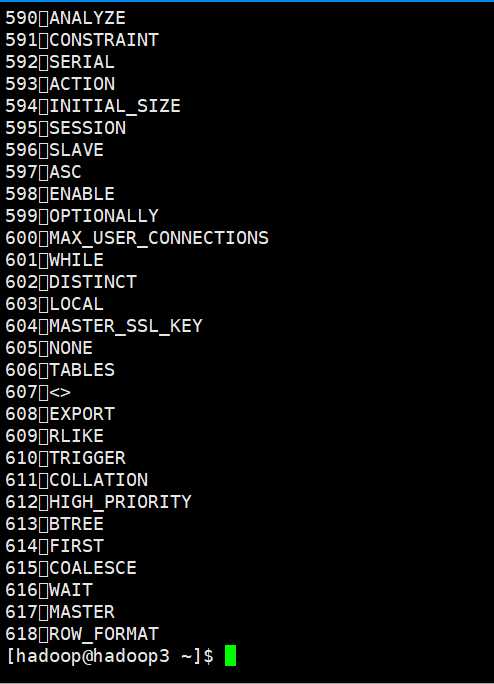
指定行分隔符和列分隔符,指定hive-import,指定覆盖导入,指定自动创建hive表,指定表名,指定删除中间结果数据目录
sqoop import --connect jdbc:mysql://hadoop1:3306/mysql --username root --password root --table help_keyword --fields-terminated-by "\t" --lines-terminated-by "\n" --hive-import --hive-overwrite --create-hive-table --delete-target-dir --hive-database mydb_test --hive-table new_help_keyword
报错原因是hive-import 当前这个导入命令。 sqoop会自动给创建hive的表。 但是不会自动创建不存在的库
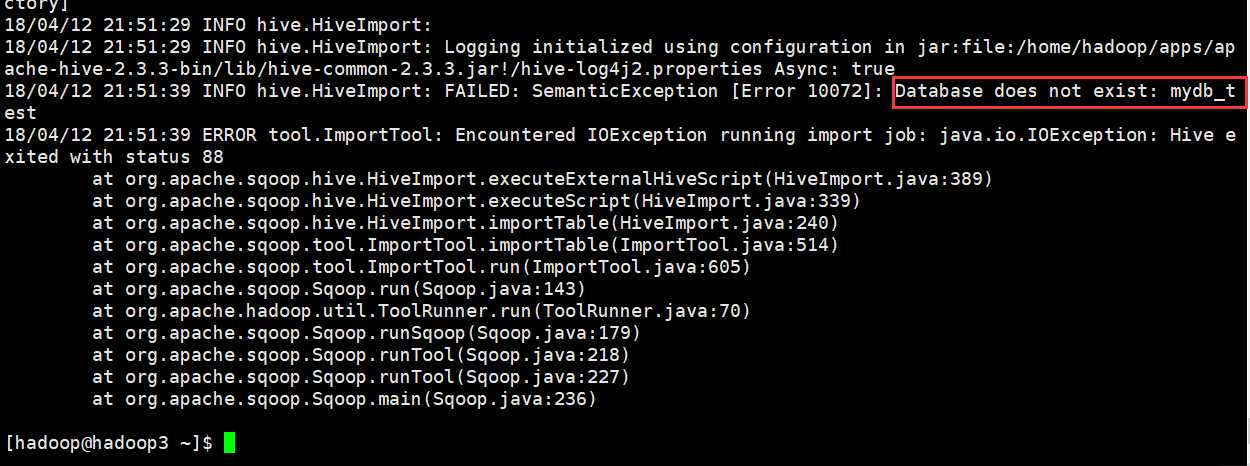
手动创建mydb_test数据块
hive> create database mydb_test; OK Time taken: 6.147 seconds hive>
之后再执行上面的语句没有报错
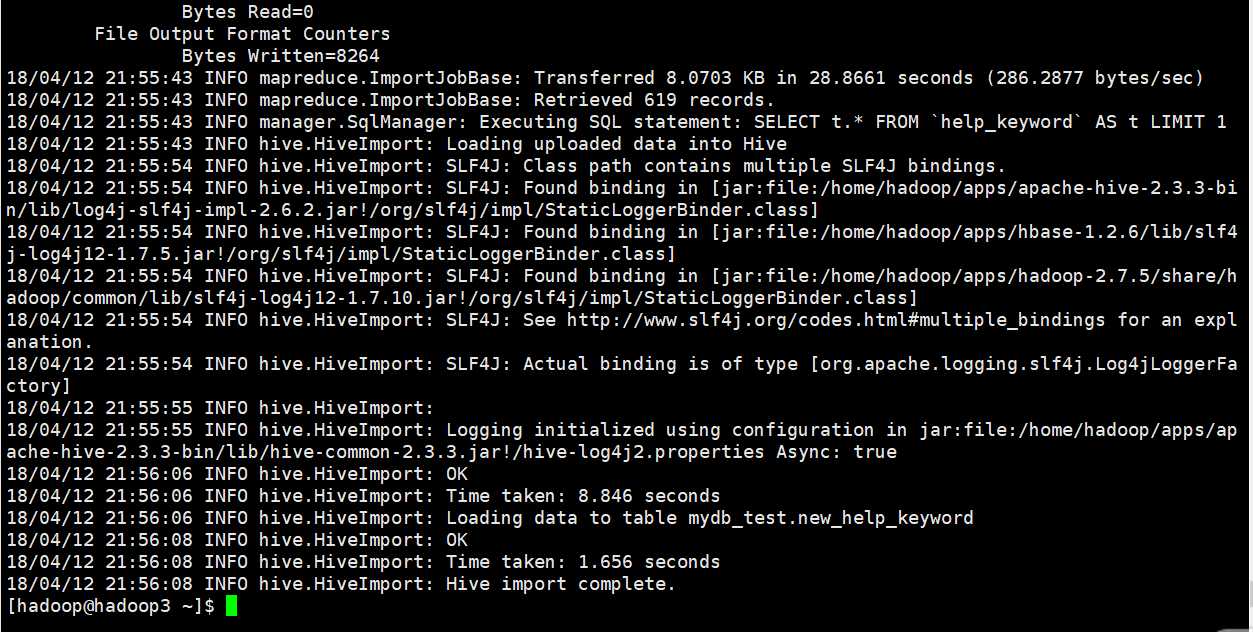
查询一下
select * from new_help_keyword limit 10;
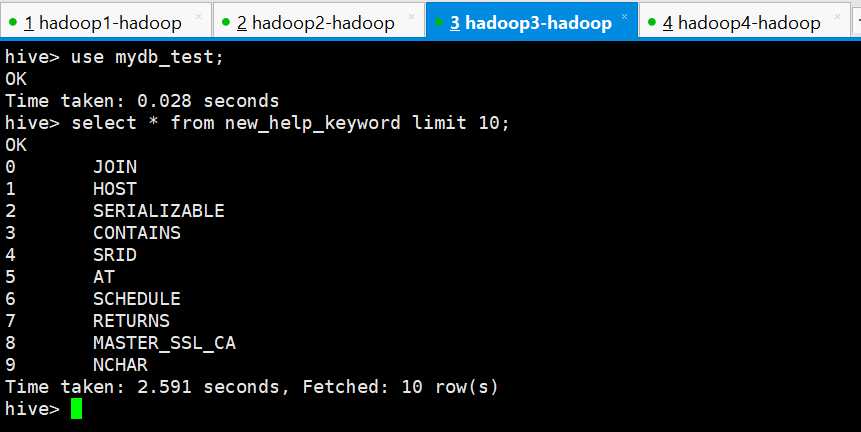
上面的导入语句等价于
sqoop import --connect jdbc:mysql://hadoop1:3306/mysql --username root --password root --table help_keyword --fields-terminated-by "\t" --lines-terminated-by "\n" --hive-import --hive-overwrite --create-hive-table \ --hive-table mydb_test.new_help_keyword --delete-target-dir
增量导入
执行增量导入之前,先清空hive数据库中的help_keyword表中的数据
truncate table help_keyword;
sqoop import --connect jdbc:mysql://hadoop1:3306/mysql --username root --password root --table help_keyword --target-dir /user/hadoop/myimport_add --incremental append --check-column help_keyword_id --last-value 500 -m 1
语句执行成功
 View Code
View Code查看结果
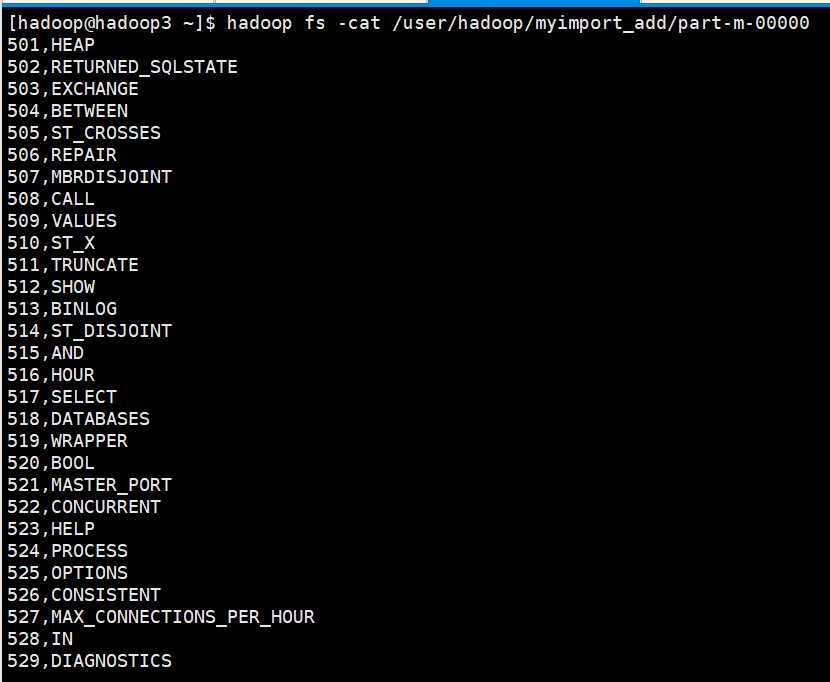
普通导入
sqoop import --connect jdbc:mysql://hadoop1:3306/mysql --username root --password root --table help_keyword --hbase-table new_help_keyword --column-family person --hbase-row-key help_keyword_id
此时会报错,因为需要先创建Hbase里面的表,再执行导入的语句
hbase(main):001:0> create ‘new_help_keyword‘, ‘base_info‘ 0 row(s) in 3.6280 seconds => Hbase::Table - new_help_keyword hbase(main):002:0>
标签:str 客户 character schema dir lib dfs -- 保存
原文地址:https://www.cnblogs.com/jifengblog/p/9302642.html